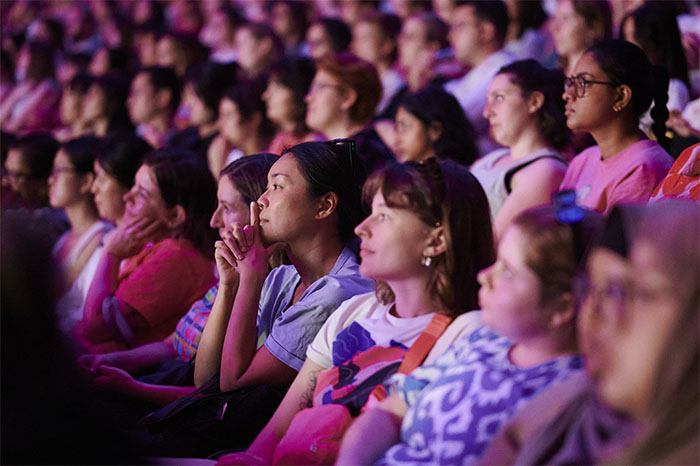
With All About Women at the Sydney Opera House running for over ten years now, you’d think there would be nothing left to say. How I wish that was the case. Held each year to mark International Women’s Day (March 8), the festival brings together some of the change-makers, the activists and the courageous women who use their stories to inspire action.
Addressing issues such as fast fashion, racism and life in prison, All About Women goes beyond gender issues. Don’t get me wrong, living in a patriarchal society, gender informs everything, but it also centres on marginalised groups, inequality in all its forms and what justice for everyone would look like.
This year saw an unbelievable line-up of talks, and I was lucky enough to head along to five of them.
Is it time to rethink porn?
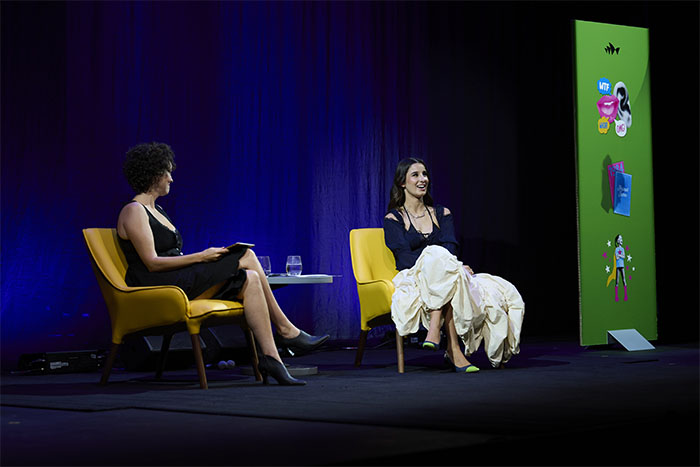
Nearly 30,000 people are watching pornography ever second, making up 1/3 of the world’s downloads.
Sexual consent activist Chanel Contos (she/her), in conversation with journalist and author Jess Hill, tackled one of the most topical feminist debates – is pornography liberating or degrading for women? Describing herself as “anti – porn” Contos emphasises this does not mean she is anti – sex. It also doesn’t equate to an issue with porn as a concept, but rather the industry that profits from it. Does anyone even know who runs Pornhub? How are they being held accountable?
One of Contos’ concerns is whether the women in these videos are even consenting to what is being done to them. The vast majority of porn is free but nothing in this world is free, so who is paying and with what? With 11 being the average age people start watching porn, another major concern is that porn becomes young people’s first introduction to sex. As Contos comments, “Learning how to have sex from porn is like learning to drive by watching Formula One.” It’s a car crash.
These concerning revelations were also reflected in a comment made by Hill when she said that rates of child sexual abuse by adults have decreased, but instances of abuse by teens has increased. While this demonstrates a correlation between sexual abuse and pornography, it also raises the question of whether porn increases people’s willingness to accept sexual violence? Well, porn and ‘Fifty Shades of Grey’.
Circling back to the topic of porn and feminism, Contos comments, “The liberation of women has always benefited men” – and she’s right. It makes me wonder what true sexual liberation for women looks like. After listening to Contos and Hill, I don’t believe it lies in an industry that doesn’t benefit everyone equally. An industry that promotes sexual violence and is teaching young women how to ‘please a man’ but not how to please themselves.
The beauty trap
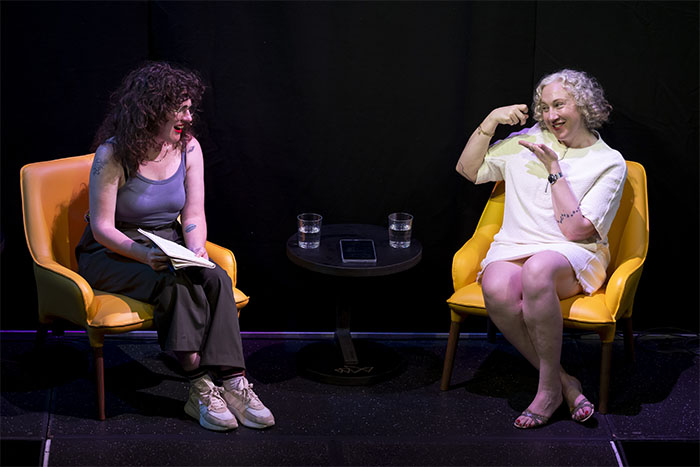
Journalist and author Marisa Meltzer (she/her) never set out to write a book about American beauty brand Glossier. What began as an article about the beauty industry quickly morphed into an in-depth look at the company and its notoriously private founder Emily Weiss.
Speaking with Bridie Jabour (she/her), Meltzer discussed trends and how they are “always a reaction to something else”. For example, ten years ago, the ‘no make-up-make-up look’, made popular by Glossier, was a direct contrast to the Kardashian’s heavily contoured appearance. While these trends were once splashed across magazines and red carpets, people now turn to social media for the latest. Models are replaced by influencers and media saturation is 24/7.
When asked by Jabour if she thought botox was just a trend, Meltzer comments, “I think it’s a constant”, the way it is used has and will continue to change. Filler on the other hand, that has a shelf life.
It has definitely become a trend for women to receive cosmetic procedures younger and younger, prompting commentary that Gen Z are starting to look older than Millennials. A firm believer that women should have complete autonomy over what they choose to do with their appearance, it did make me question how many of our decisions are driven by what we believe will truly make us happy, or driven by trends and social media.
Our bodies
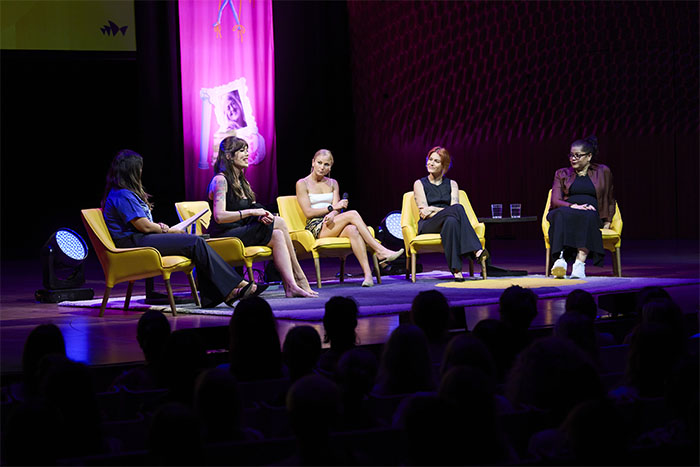
When it comes to our bodies, women are far less likely to speak up, to ‘make a fuss’, to be ‘hysterical’. Is it any wonder, when, as Tara Rae Moss (she/her) points out, both male and female doctors are less likely to believe women when it comes to their own health, especially minority women.
Survivor-advocate Grace Tame (she/her) supported this when she spoke about the long and arduous process she endured before being given an endometriosis diagnosis, commenting this “shows how underrated and undervalued women’s experiences of pain are.” Considering nearly 1 million Australian women live with endometriosis at some point in their life, how is it only now being discussed? “Because men don’t have uterus’s”, Tame laughs.
The idea that trauma can be stored within the body was raised, with moderator Jamila Rizvi (she/her) highlighting that there is the trauma of illness but also the trauma of treatment. Activist and Executive General Manager of Inclusion and Social Policy at the Australian Football League, Tanya Hosch (she/her), discussed the amputation of her leg and how those around her needed to deal with the fact that her losing a leg was confronting to them. She also touched on the racism which continues to pervade the health care profession, with marginalised women often lead to believe that any issue is their own fault, because they didn’t look after themselves. Hosch comments, we need to “think about people, not treatment.”
Writer, artist, and producer Madison Griffiths (she/her) speaks about vaginismus, a condition which sees the body automatically tighten with any penetration. It was through an ‘open letter to my vagina’ that Griffiths discovered she was not the only woman to have this condition. Enduring years of pain, where even a routine pap-smear became an ordeal, she says, “You find your own ways to exist.”
Another person who has found her own way is Moss, who is five and a half months in remission from Complex Regional Pain Syndrome. The condition saw the author experience constant pain, eventually needing the use of a wheelchair. She candidly discussed her experience living with chronic pain, commenting, “disability is a normal part of the human experience,” we are either disabled, or will be at some stage of our lives.
Each member of the panel carries with them a story. Stories of pain and trauma but also of perseverance and strength. Perhaps their greatest strength of all is their vulnerability.
Daddy issues
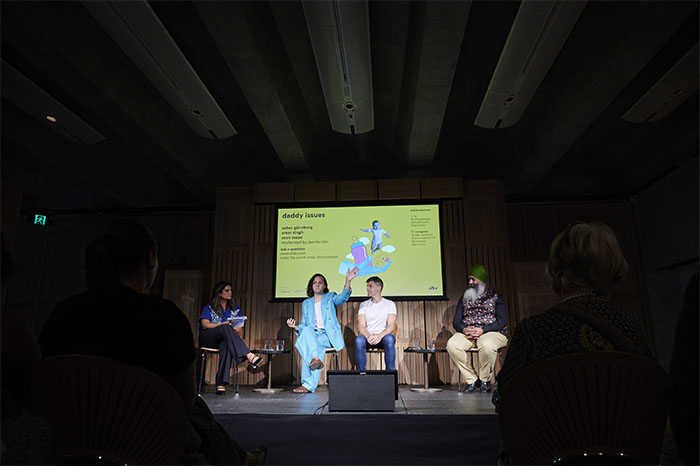
Osher Günsberg (he/him), Amar Singh (he/him) and Sean Szeps (he/him) presented three very different perspectives on fatherhood. Günsberg talked about how he never thought he wanted children, while Szeps always knew that he wanted to be a “mothering individual”. For Singh, growing up in an ethnic household, getting married and having children was just what you did.
The “hopeless dad model” was discussed, with Günsberg insisting that “we can do better” and we really need to “raise the bar” for what we expect from dads. Szeps agreed, commenting, “We still lean into stereotypes because we know it will sell.” He also believes women enjoy complaining about their partners and find it therapeutic, but that this ultimately fuels the hopeless dad stereotype. At the end of the day what does complaining accomplish? Does it make your partner step up?
Moderator, Jamila Rizvi (she/her) asked the question I think every woman in the room was considering – is the answer to praise men’s parenting? Günsberg doesn’t believe so, pointing towards systemic issues instead, commenting, “When your child is born you and your husband have the same amount of parenting experience but who is regarded as the authority?” Being in a same sex marriage with twins, Szeps agrees, explaining that many forms that were handed to him were addressed to ‘the mother’. “How are we meant to be more involved if all manuals speak to women?”
When discussing unconscious decision making and gender norms, Singh spoke about how reluctant men are to cry, that it is seen as weak. When his wife experienced a stillbirth, she had to tell him he could cry. He later comments, “We’ve got to be the modern fathers”, the way past generations parented doesn’t work anymore.
I have to confess, I found this session really challenging. Having heard so often of the demands faced by mothers, and having seen it for myself growing up, being asked to make space for fathers to express their frustrations was hard. This is in no way a reflection on the panel, whose vulnerability I greatly appreciated, but more an indication of my own bias.
It didn’t help that I’ve been attending All About Women for five years and I saw more men in this room than in any other talk over that time. I appreciate that it was a talk about ‘daddy issues’, but the room was still majority women. Why is it that women hold an interest in men’s stories, but men have no curiosity or inclination to understand women’s stories? Were there as many men attending the earlier session Mothers in the margins? Somehow, I strongly doubt it.
Play the girl
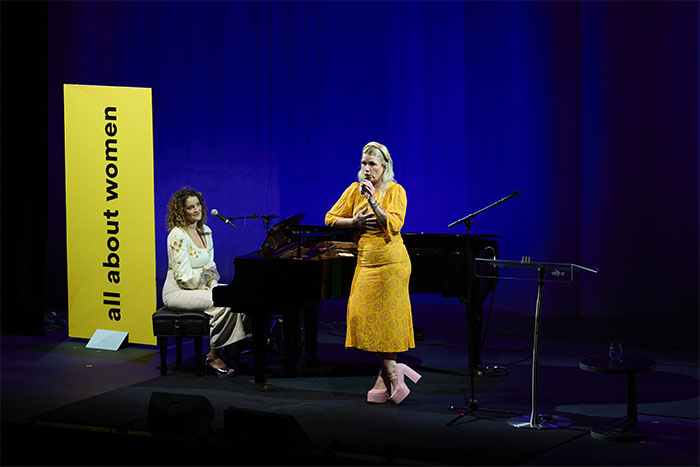
Author and activist Clementine Ford (she/her) wants you to discard everything you think you know about women and what they need in order to be ‘seen’. She opens up about being a young girl who just assumed she would get married one day, viewing marriage as “not a question of if, so much as when; not so much want as would.”
She discusses how, since the time we are small, we are programmed to want marriage and children, a man to take care of us, and if you don’t fit into this particular box, society attempts to shame you for it. Single women are seen as ‘spinsters’ and ‘crones’ – a trope clearly depicted in every classic fairy tale ever written – but what if she’s not there to destroy the woman’s happiness. What if the Evil Queen in ‘Sleeping Beauty’ and the old witch in ‘Snow White’ are just trying to save her from a toxic relationship? Especially considering both these stories end with men kissing women who are essentially passed out and unable to consent…
Ford insists that “nothing terrifies people more than a woman living on her own terms,” something she encourages all of us to aim for. Over the course of an hour, accompanied on piano and vocals by the very talented Tiaryn, Ford uses humour and song to connect with her audience, and ultimately, help us connect to ourselves.
During one particularly beautiful moment, when the crowd was asked to close their eyes and reconnect to the young person they used to be, I started to cry – and I wasn’t the only one. In a room full of strangers, I’ve never felt more seen and accepted. This is the gift Ford gives to her audience.
Rounding out the night, Tiaryn performed a stunning rendition of the Lesley Gore feminist classic, You Don’t Own Me, which had the audience clapping and singing along. The cheers at the end were deafening, and the standing ovation, well deserved.
Ford’s “love letter to the girls” was the balm I needed after a long and challenging day of talks. As I headed out of the Sydney Opera House, I picked up Hannah Ferguson’s (she/her) (speaker at Influencers are the new public intellectuals) book ‘Bite Back’, and began to read:
“Every year, we buy the same tickets to the same panels to listen to women talk about the same problems, with no men in the room and very little tangible change in sight. While these spaces may offer momentary solace and a sense of community, they are also echo chambers. Once they’re over, we venture back into the world, where the harsh reality of a very patriarchal society attempts to erode these learnings and shreds of hope.”
Talk about a harsh reality. But I must confess, more than any other year, I really felt this. All About Women is my favourite day of the year. A day where I am able to truly lean into the causes I care about in a safe space with a community I cherish being around. I feel inspired to make change and empowered to take on the world, but the feeling never lasts.
I feel angry, and not in a way that has anything to do with the festival or the incredible people I am grateful to have seen.
Perhaps it’s the overwhelming sadness which seems to have gripped the world right now, as we see women and children suffering and being murdered in Gaza, and the knowledge that, as Audre Lorde once said, none of us are free until we are all free.
Perhaps it’s the fact that before the end of February this year, 9 women had already been murdered in Australia by a current or former partner, victims of a domestic violence epidemic that only appears to be getting worse.
Or perhaps I’m angry at myself. At my inability to take real action, to use my voice in a meaningful way, to take everything I have learnt today and transform it into positive change.
Maybe that’s the real takeaway here. We need to get angry. We need to harness all that passion and determination which All About Women inspires and take it to the streets. If men won’t come to the Sydney Opera House to hear women’s stories, then perhaps we need to take the fight to them. We each have a story to tell. Of hope, of strength, of perseverance – and our feelings, especially those of anger, are valid.
So saddle up people, we ride at dawn.
FIVE STARS (OUT OF FIVE)
All About Women was held on the 10 March 2024.
For more information head to the Sydney Opera House website.
Photos by Jaimi Joy and Cassandra Hannagan.
